 Chapter 7: Why BCM is Crucial for Singapore Workplaces?
Chapter 7: Why BCM is Crucial for Singapore Workplaces?
BCM and WorkPlace: Why It is Crucial?
Mitigating Economic Impact
- Loss of Revenue: Disruptions can lead to significant revenue losses due to halted operations, lost productivity, and inability to fulfil orders.
- Market Share Erosion: Competitors better prepared to weather disruptions can gain a competitive edge, potentially eroding market share.
- Supply Chain Disruptions: Disruptions can disrupt supply chains, leading to delays, shortages, and increased costs.

- Financial Losses: Data breaches and system failures can result in substantial financial losses due to data recovery costs, legal penalties, and reputational damage.
Ensuring Legal and Regulatory Compliance
- Industry-Specific Regulations: Many industries, such as finance and healthcare, have strict regulations and compliance requirements related to business continuity.
- Demonstrating Responsibility: A well-defined BCM Plan demonstrates responsible business practices and a commitment to corporate social responsibility, which can enhance brand image and customer trust.
Prioritising Employee Safety and Well-being
- Protecting Employees: A BCM Plan ensures the safety and well-being of employees during and after a crisis by providing clear evacuation procedures, emergency contact information, and support mechanisms.
- Employee Assistance: It enables organisations to provide necessary support and resources to employees affected by the disruption, such as counselling services or financial assistance.
4. Maintaining Competitive Advantage
- Demonstrating Resilience: A robust BCM Plan reflects an organisation's resilience and agility in facing unforeseen challenges and building trust with customers, investors, and partners.
- Outperforming Competitors: By being better prepared than competitors, organisations can minimise disruption, maintain operational continuity, and gain a significant competitive advantage.
Summing Up ...
In conclusion, a well-defined and regularly tested BCM Plan is not just a "nice-to-have" but an essential component of any successful business in Singapore.
By proactively addressing potential threats and developing effective BCM strategies for mitigating their impact, organisations can safeguard their operations, protect their employees, and ensure long-term sustainability and success.
Disclaimer & Proper Usage of Guidebook
For details, please refer to Chapter 1, "SGSecure and Business Continuity: A Vital Partnership for Workplace Resilience."
Business Continuity Management for SGSecure Singapore |
||||
 |
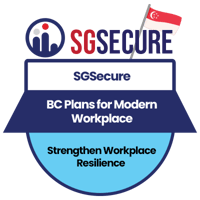 |
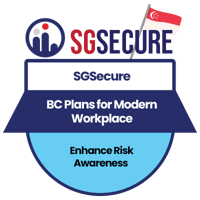 |
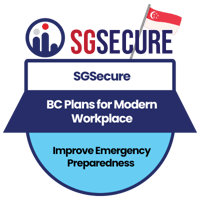 |
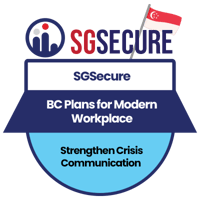 |
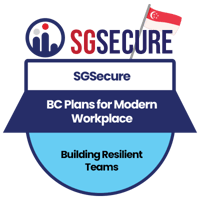 |
 |
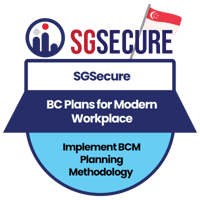 |
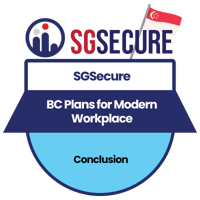 |
|
More Information About Business Continuity Management Courses

 To learn more about the course and schedule, click the buttons below for the BCM-300 Business Continuity Management Implementer [B-3] course and the BCM-5000 Business Continuity Management Expert Implementer [B-5].
To learn more about the course and schedule, click the buttons below for the BCM-300 Business Continuity Management Implementer [B-3] course and the BCM-5000 Business Continuity Management Expert Implementer [B-5].
![Register [BL-B-3]*](https://no-cache.hubspot.com/cta/default/3893111/ac6cf073-4cdd-4541-91ed-889f731d5076.png) |
 |
 |
 |
 |
 |
![FAQ [BL-B-3]](https://no-cache.hubspot.com/cta/default/3893111/b3824ba1-7aa1-4eb6-bef8-94f57121c5ae.png) |
If you have any questions, click to contact us.
|
 |
 |
 |
 |


![Email to Sales Team [BCM Institute]](https://no-cache.hubspot.com/cta/default/3893111/3c53daeb-2836-4843-b0e0-645baee2ab9e.png)

